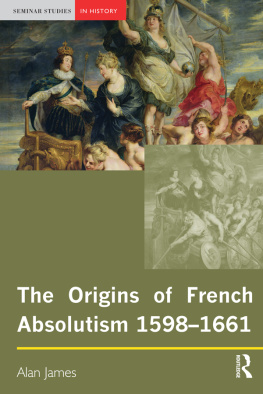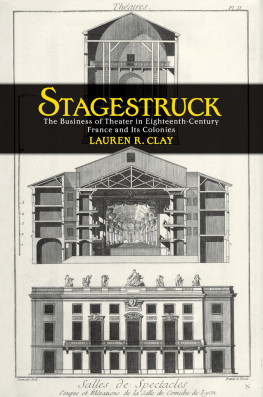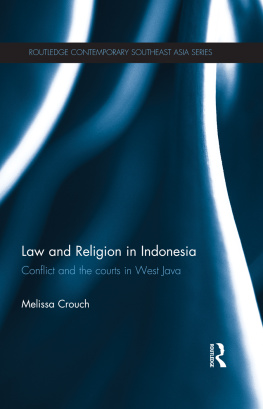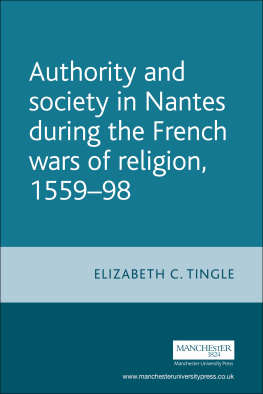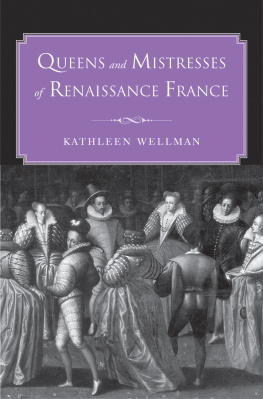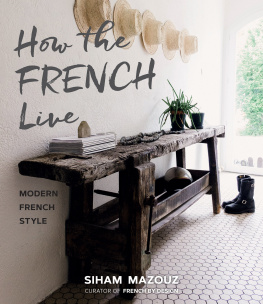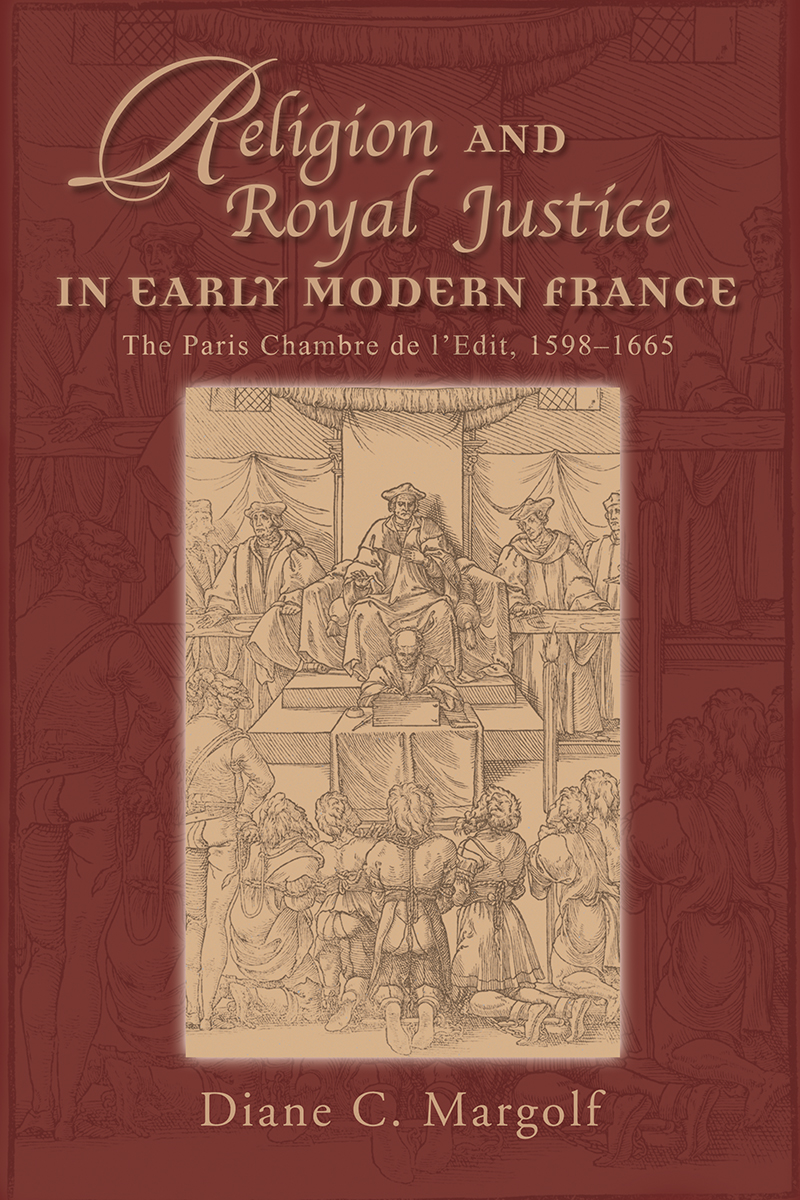Religion and Royal Justice in Early Modern France
Habent sua fata libelli
S IXTEENTH C ENTURY E SSAYS & S TUDIES S ERIES
G ENERAL E DITOR
R AYMOND A . M ENTZER
U NIVERSITY OF I OWA
E DITORIAL B OARD OF S IXTEENTH C ENTURY E SSAYS & S TUDIES
E LAINE B EILIN
Framingham State College
M IRIAM U . C HRISMAN
University of Massachusetts, Emerita
B ARBARA B . D IEFENDORF
Boston University
P AULA F INDLEN
Stanford University
S COTT H . H ENDRIX
Princeton Theological Seminary
J ANE C AMPBELL H UTCHISON
University of WisconsinMadison
C HRISTIANE J OOST- G AUGIER
University of New Mexico, Emerita
R ALPH K EEN
University of Iowa
R OBERT M . K INGDON
University of Wisconsin, Emeritus
R OGER M ANNING
Cleveland State University, Emeritus
M ARY B . M C K INLEY
University of Virginia
H ELEN N ADER
University of Arizona
C HARLES G . N AUERT
University of Missouri, Emeritus
T HEODORE K . R ABB
Princeton University
M AX R EINHART
University of Georgia
J OHN D . R OTH
Goshen College
R OBERT V . S CHNUCKER
Truman State University, Emeritus
N ICHOLAS T ERPSTRA
University of Toronto
M ERRY W IESNER- H ANKS
University of WisconsinMilwaukee
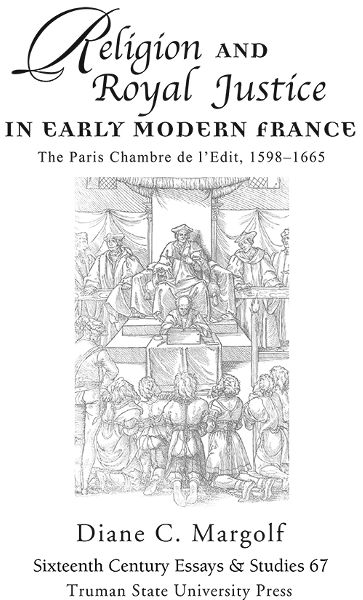
Copyright 2003 Truman State University Press, Kirksville, Missouri 63501 U.S.A.
All rights reserved
tsup.truman.edu
Cover art: Figvra Condemnationis Reorvm, from Jean Milles de Souvigny, Praxi criminis persequend (Paris, 1541), courtesy of the Robbins Collection at the School of Law, University of California, Berkeley.
Cover designer: Teresa Wheeler
Type: Monotype Corp., Centaur
Printed by Thomson-Shore, Dexter, Michigan, USA
The Library of Congress has catalogued the print edition as follows:
Library of Congress Cataloging-in-Publication Data
Margolf, Diane Claire.
Religion and royal justice in early modern France : the Paris Chambre de lEdit, 15981665 / Diane C. Margolf.
p. cm. (Sixteenth century essays & studies ; v. 67)
Includes bibliographical references and index
ISBN 1-931112-25-8 (Cloth, casebound : alk. paper) ISBN 1-931112-26-6 (pbk. : alk. paper)
1. HuguenotsLegal status, laws, etc.FranceHistory17th century.
2. France. Chambre de lEdit (Paris) I. Title. II. Series.
KJV4207.H85 M37 2001
342.44'0852dc21
200300796 Rev.
No part of this work may be reproduced or transmitted in any format by any means without written permission from the publisher.
The paper in this publication meets or exceeds the minimum requirements of the American National Standard for Information SciencesPermanence of Paper for Printed Library Materials, ANSI Z39.48-1992.
NOTE: Sequential numbers in square brackets [] in the body of the text refer to page numbers of the print edition; citations appeared as footnotes in the print edition.
Note: Because of display limitations of e-readers, some special characters (e.g., Greek or Hebrew letters, cedillas, characters in Eastern European languages, accents or other diacritical marks) may ont display properly in the e-book version of this work.
Contents
Huguenots & the Law in Seventeenth-Century France
Magistrates, Litigants, & the Paris Chambre de lEdit
Memory, Litigation, & the Paris Chambre de lEdit
The Family, the Law, & the Paris Chambre de lEdit
Violence, Punishment, & Public Peace
The Huguenots & the Law Revisited
This book began with an offhand reference to the special law courts mandated by the Edict of Nantes which I heard in a lecture during my first year in graduate school. In the intervening years, as it has developed from a seminar paper to a dissertation, through conference papers and essays to a monograph (with much revising in between), I have incurred many debts which it is now a pleasure to acknowledge. My research was funded by a Bourse Chateaubriand in 1987 through 1988, which enabled me to spend a second year reading seventeenth-century court documents in Paris, as well as later grants by the Department of History of the College of Charleston and the Professional Development Program at Colorado State University. A number of advisors, friends, and fellow scholars have sustained my work on the Chambre de l'Edit with their interest, comments, and suggestions: the late Harry Miskimin, Keith Luria, David Underdown, Lee Palmer Wandel, Amanda Eurich, Al Hamscher, Ron Love, Peter Sahlins, Maarten Ultee, Bertrand Van Ruymbeke, and Michael Wolfe. A special thanks to Ray Mentzer, who is in a sense the godfather of this project; had he not encouraged me to continue with it at a very early stage, it might never have reached the printed page. In Paris, Mme Marie-Noelle Baudouin-Matuszek provided invaluable assistance, friendship, and hospitality to a novice American graduate student, which have continued ever since our first meeting. The late M. Yves Metman offered some timely lessons in paleography, and Mme Marie-Aime Belle (along with her daughter Nadge) taught me a great deal about the Parisians of today while I was studying those of the early modern era. I also acknowledge the staffs of the Archives Nationales (now the Centre d'Accueil et des Recherches des Archives Nationales), the Bibliothque Nationale, the Bibliothque de la Socit de l'Histoire du Protestantisme Franais, the Beinecke Rare Book and Manuscript Library, and Sterling Memorial Library at Yale University for their assistance.
Finally, I thank my parents for their love and support throughout my years of study, teaching, writing, and research. This book is dedicated to them.
[ix] I N F EBRUARY 1602, A H UGUENOT WEAPONRY MAKER NAMED N OEL B ILLOT stood before a panel of magistrates in a chamber of the Palais de Justice in Paris. A year earlier, the royal judge and prosecutor in Billots native town of Mcon had convicted him of using at various times in public places seditious language and discourse tending to scandal, against the edicts and rules of pacification.
The case of Noel Billot illustrates many of the issues explored in the pages that follow. This book is about litigants like Billot and the legal disputes they brought before the Paris Chambre de lEdit in seventeenth-century France. The chambers origins lay in the Wars of Religion of the later sixteenth century, when Huguenots feared the partisanship of the predominantly Catholic judiciary. In 1598, the Edict of Nantes declared an end to the warfare and provided a legal blueprint for future relations among Huguenots and Catholics in France. Its provisions reflected elements found in many previous edicts of pacification and offered an institutional guarantee of protection and privileges for the Huguenot minority: special law courts, composed of both Huguenot and Catholic magistrates, which would resolve disputes involving Huguenot litigants. Chambres mi-parties, so called because they included equal numbers of judges from both confessions, were [x] to be affiliated with the parlements of Grenoble, Bordeaux, Rouen, and Toulouse. A fourth court, christened the Chambre de lEdit or chamber of the edict, would be established for the Parlement of Paris. The Paris Chambre de lEdit functioned under this mandate until formally dissolved by royal edict in 1669.


